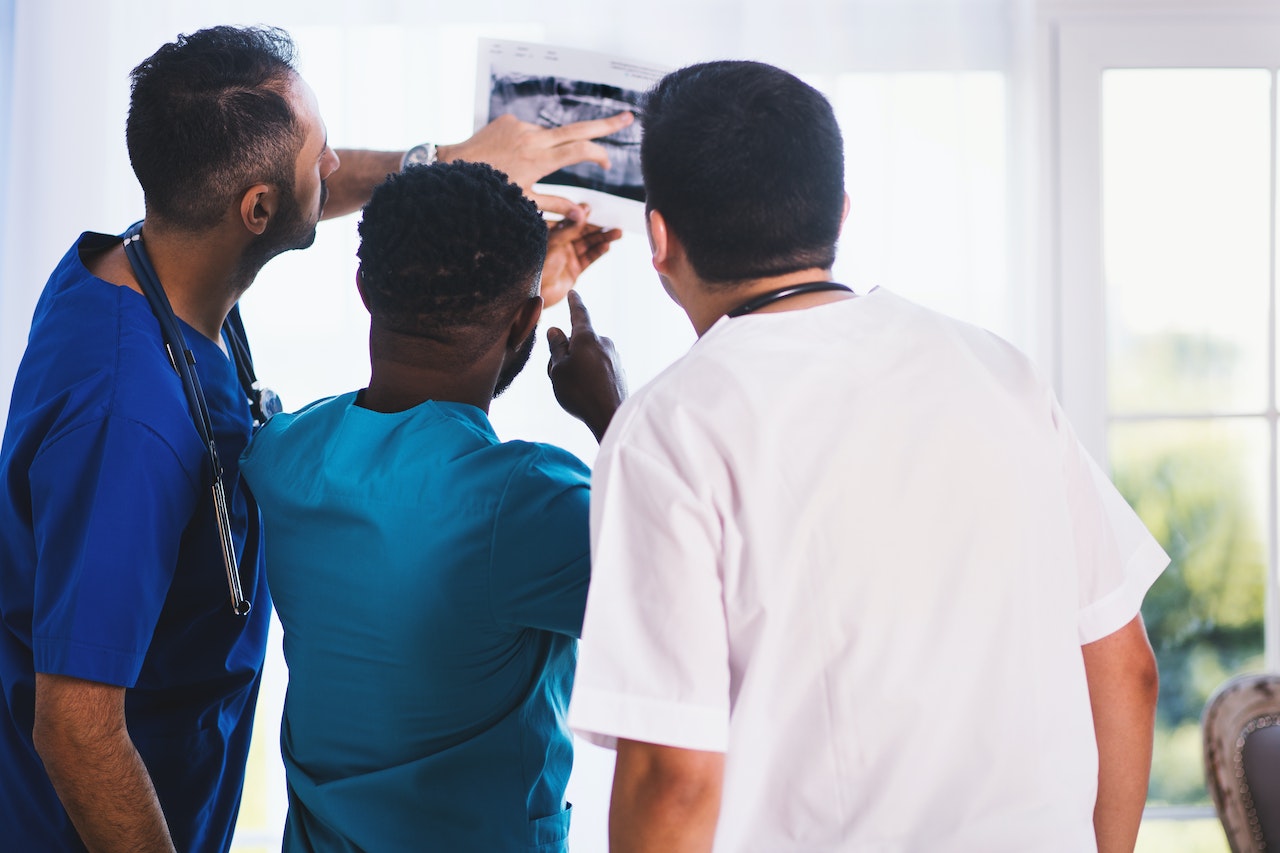Critical thinking is a crucial skill for individuals working in various healthcare domains, such as doctors, nurses, lab assistants, and patients. It serves as the foundation for evidence-based practice in healthcare and education and is essential for making informed decisions while evaluating research findings, which may sometimes be mixed or even conflicting [The BMJ].
In healthcare and medicine, critical thinking facilitates a more in-depth understanding of patients’ situations, complex clinical scenarios, and the ability to integrate various sources of information to make informed decisions. Professionals with strong critical thinking skills can better evaluate options, weigh potential risks and benefits, and ultimately choose the most appropriate course of action for their patients [NurseJournal].
Developing critical thinking skills in the healthcare sector is vital not only for patient safety but also for the professional development and career advancement of clinical and administrative nursing leaders. Ensuring that these skills are continuously nurtured and improved is critical for the ongoing success of the healthcare industry and for delivering the highest quality of patient care [PubMed].
Critical Thinking in Healthcare and Medicine
Critical thinking in healthcare and medicine involves the application of evidence-based practices and analytical skills to make informed decisions about patient care. This process often requires healthcare professionals to reflect on their knowledge, collaborate with colleagues, and evaluate the validity of various sources of information, including medical research, clinical experience, and patient preferences.
An example of critical thinking in healthcare is when a primary care doctor encounters a patient with acute, atypical chest pain. The doctor must assess the patient’s condition, review their medical history, and consider possible diagnoses while ruling out other potential causes of the pain [source]. Applying critical thinking skills enables healthcare practitioners to provide safe and effective care that is tailored to the needs of each patient.
Developing critical thinking skills is vital for healthcare professionals, as they often face complex and unique cases, where the available evidence is uncertain or conflicting. The ability to question claims, evaluate sources, and make informed decisions based on evidence contributes to improved patient outcomes and the overall quality of care [source].
Some key components of critical thinking in healthcare and medicine include:
- Applying clinical reasoning to diagnose and treat patients
- Assessing the reliability of medical research and information sources
- Identifying gaps in knowledge and seeking additional information as needed
- Collaborating with team members and integrating their perspectives into patient care
- Reflecting on performance and implementing strategies for continuous improvement
By fostering these critical thinking skills, healthcare professionals can navigate the complexities of their field, make better clinical decisions, and ultimately provide a higher standard of patient care.
The Role of Critical Thinking in Decision-Making
Critical thinking plays a pivotal role in healthcare and medicine, affecting every aspect of the decision-making process. In clinical practice, it serves a key function in assessing patients’ symptoms, interpreting diagnostic results, and choosing appropriate interventions. This cognitive skill involves questioning, analysis, synthesis, interpretation, inference, inductive and deductive reasoning, intuition, application, and creativity to guide professional judgments and actions (source).
In many medical situations, such as triage, critical thinking can be crucial to ensure appropriate prioritization of patients based on their medical needs. Healthcare professionals must quickly adapt and process an influx of information to efficiently make critical decisions (Rasmussen University). Some practical examples of critical thinking in decision-making include:
- Evaluating multiple treatment options and selecting the best course of action for a particular patient;
- Appraising and integrating relevant evidence from research into clinical practice;
- Asking meaningful questions that lead to useful answers and promote deeper understanding of complex medical issues (NurseJournal); and
- Identifying personal biases and potential barriers that could impair objective decision-making.
Furthermore, fostering critical thinking in medical education empowers healthcare professionals to make informed decisions, even in ambiguous or uncertain circumstances. Cross-sector collaboration between healthcare and education sectors can nurture and enhance the development of these essential skills, creating better-prepared providers (The BMJ).
Developing Critical Thinking Skills in Healthcare Professionals
Enhancing critical thinking abilities in healthcare professionals is crucial for promoting effective decision making, improving patient outcomes, and maintaining quality patient care. This can be achieved through various approaches, including education and training, mentoring, and continuing professional development.
Education and Training
Formal education and specialized training programs play a vital role in developing critical thinking skills among healthcare professionals. These programs should emphasize the importance of honing these skills as an essential component of their professional growth. Incorporating interactive learning methods, such as case studies, group discussions, and problem-solving exercises, can encourage participants to engage in reflective and analytical thinking. Courses on clinical reasoning and decision making can further strengthen these abilities.
Mentoring
Mentoring has been shown to be an effective method for fostering critical thinking skills in healthcare professionals. Experienced mentors can support and guide their mentees in developing the habits of mind associated with critical thinking, such as open-mindedness, intellectual curiosity, and reflection. The mentor-mentee relationship offers a platform for the exchange of ideas, constructive feedback, and experiential learning. By reflecting on real-life clinical scenarios with their mentors, mentees can hone their critical thinking skills to make better informed decisions in their practice.
Continuing Professional Development
Continuing Professional Development (CPD) is an integral component of maintaining and improving critical thinking skills in the healthcare setting. By participating in relevant workshops, seminars, and courses, healthcare professionals can stay up-to-date with the latest advances in their field and strengthen their decision-making abilities. Additionally, engaging in regular self-reflection and assessment allows them to identify areas for improvement and seek targeted education to further enhance their critical thinking skills.
To summarize, developing critical thinking skills in healthcare professionals is crucial in promoting optimal patient care, decision-making, and overall professional growth. Fostering these skills through education and training, mentoring, and continuing professional development ensures that healthcare providers remain effective, well-rounded professionals.
Critical Thinking Tools and Techniques
Critical thinking in healthcare and medicine is an essential skill for professionals to make well-informed decisions and provide quality care to patients. This process combines cognitive abilities with strategic skills to achieve specific objectives. This section will explore some common tools and techniques used to promote critical thinking in healthcare professionals.
1. Interpretation: Professionals should be able to understand and explain the meaning of various types of information, such as diagnostic results or patient medical histories. They need to interpret complex data and make sense of it to provide the best possible care. This skill is important for accurate diagnosis, efficient treatment, and effective communication with patients and colleagues (APA).
2. Analysis: Critical thinking in healthcare requires professionals to assess the quality and relevance of information, such as research findings or clinical guidelines. By breaking down information into its constituent parts and evaluating its strengths and weaknesses, professionals can make informed decisions that are based on evidence and best practices (The BMJ).
3. Evaluation: Healthcare professionals need to appraise the credibility, accuracy, and applicability of information. Evaluating the reliability of sources, such as the reputation of journals or the robustness of research, helps ensure that only high-quality, trustworthy information is used to guide clinical decisions (Nursing Clinical Practice, Education and Research).
4. Inference: Drawing conclusions from available information is a crucial aspect of critical thinking in healthcare. Professionals must infer the best course of action, considering all relevant variables and factors, such as patient preferences, clinical guidelines, and ethical considerations. Inference requires professionals to weigh the potential benefits and harms and use their judgment to make sound decisions (Critical Thinking in Critical Care).
5. Self-regulation: It is essential for healthcare professionals to monitor and adjust their thinking processes by maintaining an open-minded and reflective approach. Self-regulation involves the ability to identify biases and inconsistencies in one’s thinking, question assumptions, and adapt to new information or insights as they emerge (Scoping Review of Critical Thinking).
Using these critical thinking tools and techniques, healthcare professionals can better navigate complex situations, problem-solve effectively, and ensure that they are providing the highest quality care to their patients.
Challenges in Implementing Critical Thinking in Healthcare
One of the major challenges in implementing critical thinking in healthcare is overcoming personal biases. These biases can sometimes lead healthcare professionals to make incorrect inferences or judgments, which ultimately affects patient care. In nursing, for example, personal biases are regarded as one of the most common pitfalls to critical thinking (NurseJournal).
Another challenge is the risk of conflicting metrics. Healthcare professionals often need to balance various metrics and targets to provide the best possible care to patients. Sometimes, success in one area may come at the expense of another, making it difficult to find a balance conducive to critical thinking (International Journal for Quality in Health Care).
Moreover, healthcare professionals must also deal with disconnected metrics. Staff members may face multiple targets and metrics that appear unrelated or difficult to comprehend, making it harder for them to incorporate critical thinking into their decision-making processes (International Journal for Quality in Health Care).
In terms of education, there is an ongoing need to identify the most effective strategies for teaching critical thinking in healthcare. A scoping review of critical thinking literature in healthcare education highlights the broad range of methods used to teach critical thinking, as well as the variability in research methodologies (PubMed). This suggests a need for further research and consensus to develop the most effective critical thinking educational methods for healthcare professionals.
The Impact of Critical Thinking on Patient Outcomes
Critical thinking is essential in healthcare as it enables healthcare professionals to make well-informed decisions, ultimately leading to improved patient outcomes. This higher-order thinking skill involves the application of knowledge and experience to identify patient problems and direct clinical judgments and actions that result in positive outcomes (NCBI).
One of the ways critical thinking can positively impact patient outcomes is through accurate problem identification. This skill can help healthcare professionals correctly diagnose patients’ issues, resulting in a more efficient and effective care plan (ScienceDirect).
Another impact of critical thinking on patient outcomes is seen through proper planning and administration of care. A healthcare professional who utilizes critical thinking skills can carefully examine all aspects of patient care and make informed decisions that minimize harm and improve outcomes (ScienceDirect).
Furthermore, critical thinking skills can also enhance communication and collaboration among healthcare professionals. This can lead to more effective teamwork and coordinated care, ultimately benefiting the patient and improving their overall experience in the healthcare system.
In summary, incorporating critical thinking skills into healthcare practice can play a significant role in improving patient outcomes. Accurate problem identification, effective planning, and administration of care, coupled with better communication and collaboration among professionals, all contribute to enhancing the quality of care delivered to patients.
Future Perspectives
As the healthcare industry continues to evolve, the importance of critical thinking skills in medical practice is becoming increasingly evident. The ability to critically evaluate evidence, diagnose complex problems, and develop effective solutions will be paramount for healthcare providers as they face new challenges and adapt to novel technologies.
One of the exciting prospects for the future of critical thinking in healthcare is cross-sector collaboration. Professionals from various disciplines, such as medicine, nursing, psychology, and education, have the opportunity to work together to gain new insights and develop innovative approaches to patient care. This collaboration could lead to significant advancements in both healthcare practice and medical education, as described in The BMJ.
Furthermore, the integration of new technologies like artificial intelligence (AI) and machine learning will necessitate a greater emphasis on critical thinking. Healthcare practitioners will need to adapt and learn how to effectively use these tools while maintaining their ability to think critically about diagnoses and treatment plans.
Medical education must also evolve to reflect the shifting landscape of healthcare. Educators should prioritize the development of critical thinking skills in their curricula, alongside clinical competencies and lifelong learning. This entails incorporating teaching strategies that foster problem-solving, evidence-based decision making, and collaboration, as highlighted in The BMJ.
In summary, the future of critical thinking in healthcare and medicine holds promise for enhancing patient care and improving medical education. By fostering a culture of collaboration and embracing new technologies, healthcare professionals can leverage their critical thinking skills to navigate complex challenges and drive innovation in their field.





